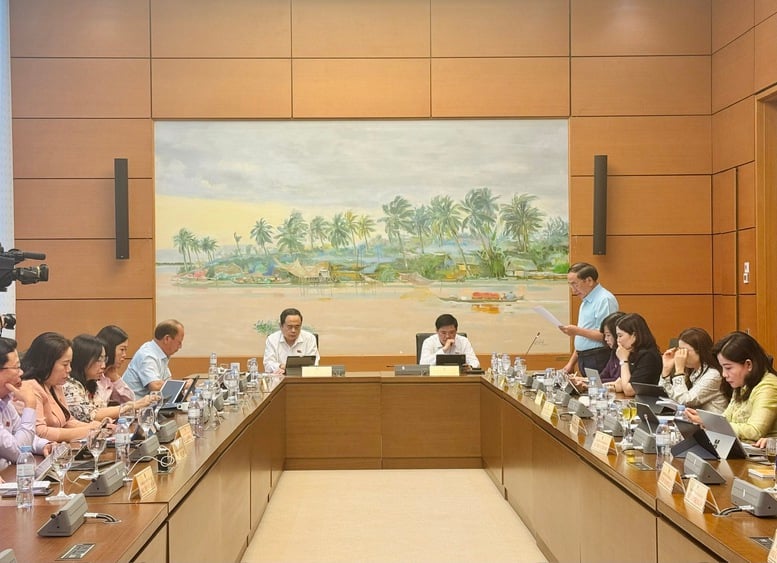
National Assembly deputies discuss in group 13 - Photo: VGP/Thu Giang
On the afternoon of May 21, continuing the 9th session, the National Assembly discussed in groups many important contents, notably the Draft Resolution of the National Assembly on reducing value added tax (VAT).
Discussing at Group 11 (including delegations from Bac Kan, Long An, Son La, Vinh Long), delegate Nguyen Thi Quyen Thanh (Vinh Long delegation) said that in the context of the global and domestic economy still facing many unpredictable risks and instabilities, the VAT reduction policy is one of the effective tools to promote domestic consumption, support production and business and contribute to macroeconomic stability.
According to delegate Thanh, the Government's proposal to extend the policy implementation period until the end of 2026 and expand the beneficiaries of tax incentives is necessary to institutionalize the socio-economic growth target in 2025 with a GDP growth target of 8%, thereby creating a foundation for double-digit growth in the 2026-2030 period.
The tax reduction policy not only helps reduce the cost of goods and services, increasing the competitiveness of businesses, but also directly supports people by reducing consumption costs. This is especially meaningful in the context of people's income not fully recovering after the pandemic and businesses still facing many difficulties.
Since 2022, the VAT reduction policy has shown clear effectiveness. For example, in 2022, this policy supported businesses and people with about VND 51.4 trillion, contributing to the total retail sales of goods and consumer service revenue increasing by nearly 20% compared to 2021. In 2023, the policy continued to support VND 23.4 trillion, helping consumption increase by nearly 10% compared to the previous year. In 2024 alone, the support level reached VND 49 trillion, contributing to the annual GDP growth of 7.09%, controlling inflation at 3.63% and achieving a trade surplus of more than 24 billion USD.
In the first two months of 2025, the amount of VAT reduced according to the policy is estimated at about VND 8.3 trillion. As a result, the total retail sales of goods and consumer service revenue reached VND 1,137.5 trillion, up 9.4% over the same period last year. In addition, the trade balance of goods continued to maintain a surplus with an estimated value of USD 1.47 billion.
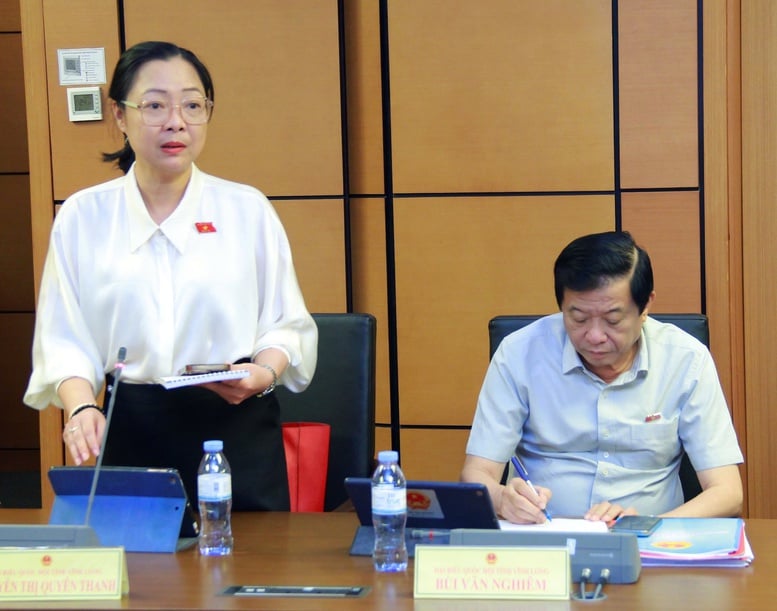
Delegate Nguyen Thi Quyen Thanh (Vinh Long delegation) expressed her opinion in discussion at group 11.
Consider the impact on the budget and increase the efficiency of tax administration
However, delegate Nguyen Thi Quyen Thanh also said that to ensure the sustainability of the tax reduction policy, it is necessary to carefully assess the impact on the state budget. According to the Government's report, the expected reduction in state budget revenue in the last 6 months of 2025 is about 39.54 trillion VND and the whole year of 2026 is 82.2 trillion VND - a total of more than 121 trillion VND.
Delegates suggested that the Government strengthen effective revenue management measures such as promoting digital transformation, applying artificial intelligence (AI), exploiting big data to manage tax debts, classifying tax refund records, and expanding electronic invoices. At the same time, it is necessary to step up inspection, examination, reform administrative procedures and tighten revenue collection in areas such as real estate, e-commerce, digital platform business, etc.
Along with that, budget expenditure management also needs to be carried out closely and effectively, increasing savings and mobilizing legal resources for urgent tasks, ensuring budget balance at all levels.
At Group 13 (Bac Ninh, Hau Giang, Dak Lak, Lao Cai), delegate Sung A Lenh (Lao Cai delegation) also expressed his agreement with the content of the draft Resolution, especially the policy of reducing 2% of the value added tax rate on goods and services currently subject to a tax rate of 10%.
According to delegate Sung A Lenh, this is a solution that continues to demonstrate the spirit of companionship and support for businesses and people to restore production and stimulate consumption in the context of the economy still facing many potential difficulties.
The delegate also supported the policy application period from July 1, 2025 to December 31, 2026. He said that this is a step in the right direction, shifting from short-term to medium-term support, creating peace of mind for businesses to build production and business plans.
However, to ensure effectiveness and adaptability, delegates proposed adding a periodic assessment mechanism and the ability to flexibly adjust in case of unexpected fluctuations such as epidemics, natural disasters, and global economic risks. He also emphasized the need to simplify procedures for declaration, deduction, and tax refunds and strengthen communication and support for businesses - especially small, micro, cooperatives, and business households - to access policies.
Agreeing with the above viewpoint, delegate Le Minh Nam (Hau Giang delegation) assessed that the Government's proposal is reasonable when taking domestic aggregate consumption demand as an important driving force to promote economic growth.
Mr. Nam believes that expanding the scope of subjects eligible for VAT reduction is necessary to support increased purchasing power, stimulate consumption, domestic tourism, and special goods that contribute significantly to production and business.
However, delegate Le Minh Nam also noted that it is necessary to assess more carefully the impact on state budget revenue, ensuring the implementation of tax reduction policies associated with the goal of medium-term fiscal stability and public debt safety. Tax reduction policies need to be implemented synchronously with other tax policies such as environmental protection tax, special consumption tax... to ensure consistency and avoid overlap.
In terms of implementation, delegate Nam proposed that the Government should specify management solutions to ensure policy effectiveness, from design to implementation. He also fully supported the policy implementation plan for 1.5 years (instead of 6 months as before) so that businesses can truly absorb the policy and adjust their production and business plans accordingly.
Thu Giang
Source: https://baochinhphu.vn/dbqh-ung-ho-giam-thue-gtgt-den-het-nam-2026-de-thuc-day-tieu-dung-giu-da-tang-truong-102250521164734669.htm


![[Photo] Scientific workshop "Building a socialist model associated with socialist people in Hai Phong city in the period of 2025-2030 and the following years"](https://vphoto.vietnam.vn/thumb/1200x675/vietnam/resource/IMAGE/2025/5/21/5098e06c813243b1bf5670f9dc20ad0a)
![[Photo] Prime Minister Pham Minh Chinh attends the groundbreaking ceremony of Trump International Hung Yen Project](https://vphoto.vietnam.vn/thumb/1200x675/vietnam/resource/IMAGE/2025/5/21/ca84b87a74da4cddb2992a86966284cf)
![[Photo] Determining the pairs in the team semi-finals of the National Table Tennis Championship of Nhan Dan Newspaper](https://vphoto.vietnam.vn/thumb/1200x675/vietnam/resource/IMAGE/2025/5/21/eacbf7ae6a59497e9ae5da8e63d227bf)


![[Photo] Prime Minister Pham Minh Chinh receives Rabbi Yoav Ben Tzur, Israeli Minister of Labor](https://vphoto.vietnam.vn/thumb/1200x675/vietnam/resource/IMAGE/2025/5/21/511bf6664512413ca5a275cbf3fb2f65)




















































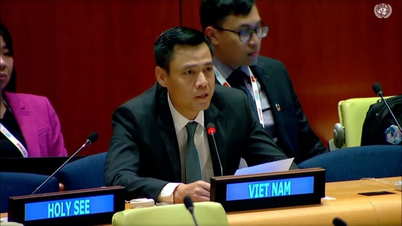
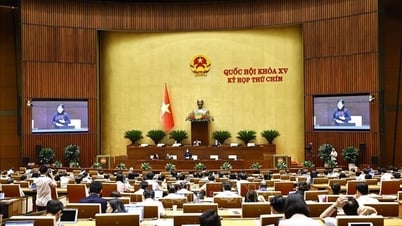




















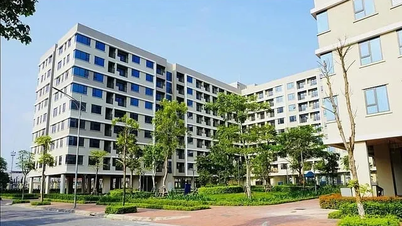












Comment (0)